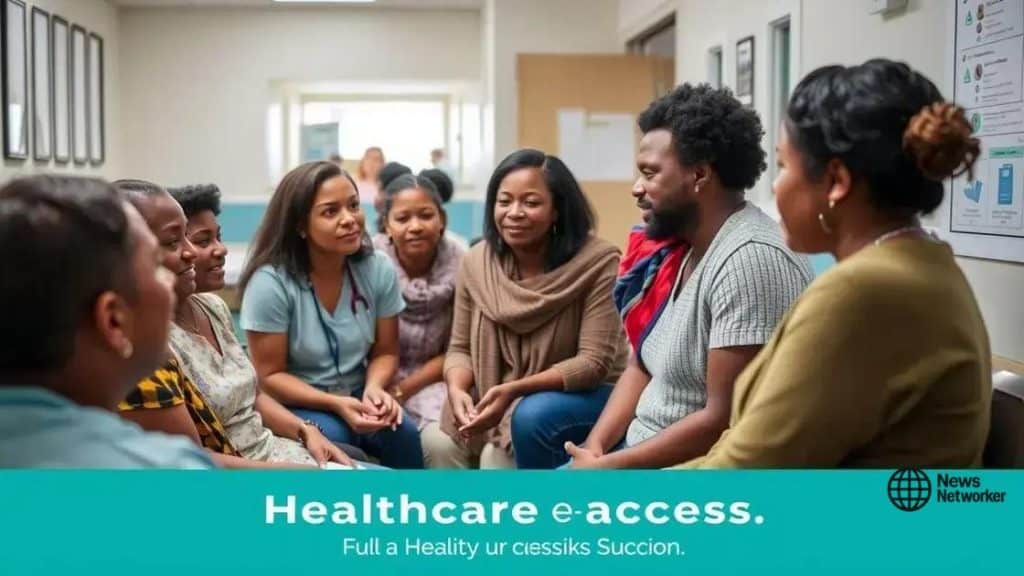Health benefits and healthcare access: what you need to know

Health benefits and healthcare access can be enhanced by setting clear goals, utilizing resources effectively, staying informed, and leveraging technology like telehealth and health apps for better management.
Health benefits and healthcare access play a vital role in our daily lives. Have you ever stopped to think about how these elements influence your well-being? Exploring these topics can lead to better choices and improved health.
Understanding health benefits and their types
Understanding health benefits is essential for making informed decisions about your well-being. There are various types of health benefits that cater to different needs, offering support in many areas. Knowing these can help you choose options that fit your lifestyle.
Types of Health Benefits
Health benefits can vary widely, but they typically include the following:
- Medical Coverage: This includes insurance that pays for doctor visits, hospital stays, and surgeries.
- Preventive Services: These are services aimed at preventing health issues, like vaccinations and screenings.
- Mental Health Support: Many plans cover therapies and counseling sessions to support mental well-being.
- Wellness Programs: These programs promote healthy lifestyles through fitness classes, nutritional counseling, and more.
By understanding these categories, you can identify which benefits align with your needs. For instance, if you’re focused on preventive care, you might seek plans with comprehensive screening options. Additionally, it’s important to be aware that some employers offer unique benefits that can enhance your overall healthcare experience.
Moreover, the availability of health benefits can significantly impact your access to necessary medical care. In many cases, these benefits make it feasible for individuals to seek preventive treatments or necessary medical interventions without financial strain. Being proactive about your health means leveraging these benefits whenever possible.
Why Health Benefits Matter
Health benefits are crucial not only for individuals but also for communities. Access to quality healthcare improves public health outcomes and fosters a healthier society. Furthermore, understanding your health benefits can empower you to take charge of your health. Knowledge is power when it comes to navigating the complexities of healthcare.
Challenges in accessing healthcare services
Accessing healthcare services can be challenging for many people. Various barriers exist that prevent individuals from receiving the care they need. These challenges can affect how well people manage their health and utilize available resources.
Common Barriers to Healthcare Access
Several factors can hinder access to healthcare services:
- Financial Constraints: High costs of treatments and medications can discourage individuals from seeking care.
- Lack of Transportation: Inadequate transportation options can make it difficult for individuals to reach medical facilities.
- Insurance Issues: Some people may lack health insurance or have limited coverage, making it difficult to afford necessary care.
- Geographical Limitations: Rural areas may have fewer healthcare providers, impacting availability and convenience.
These barriers not only affect individual health but also have broader implications for communities. For instance, when people delay or avoid medical attention due to financial burdens, they may face more severe health issues later on. Therefore, identifying and addressing these hurdles is crucial for improving health outcomes.
Additionally, health Literacy plays a significant role in accessing services. Individuals who do not understand how to navigate the healthcare system might miss out on essential services. Promoting health education can empower communities to seek help when needed and utilize their health benefits effectively.
Collaborative Solutions
Addressing these challenges requires a collaborative approach. Engaging healthcare providers, policymakers, and communities can lead to innovative solutions. For example, telehealth services have emerged as a useful alternative, offering patients access to care without the need for travel. These advancements can bridge gaps in accessibility and ensure that individuals receive timely care.
The impact of preventive care on health outcomes

The impact of preventive care on health outcomes is significant and can lead to a healthier population. By focusing on prevention, individuals can avoid severe health issues that require costly treatments.
Benefits of Preventive Care
Preventive care includes regular check-ups, screenings, and vaccinations. These practices can help in various ways:
- Early Detection: Identifying health issues early can lead to more effective treatments and better outcomes.
- Lower Healthcare Costs: Preventing diseases often saves money by reducing the need for extensive medical intervention.
- Improved Quality of Life: Staying healthy allows individuals to enjoy life without the burdens of chronic illnesses.
- Community Health Enhancement: When more people engage in preventive care, the overall health of communities improves.
Additionally, preventive care encourages healthier lifestyles, promoting a focus on nutrition, exercise, and mental well-being. By establishing these habits, individuals can enhance their quality of life and longevity.
Implementing preventive care programs can also positively influence public health policies. As communities recognize the benefits of these initiatives, it becomes easier to advocate for necessary resources and support.
Barriers to Preventive Care
Despite its many benefits, access to preventive care can be limited. Factors such as cost, lack of awareness, and geographical obstacles often stand in the way. Addressing these barriers is essential for maximizing the potential of preventive services. Efforts must include expanding insurance coverage for preventive measures and raising awareness about available resources.
In conclusion, embracing a preventive care model can significantly reshape health outcomes for individuals and communities alike. Prioritizing this approach can lead to a healthier future, marked by reduced disease prevalence and enhanced well-being.
How technology is improving healthcare access
Technology is playing a crucial role in improving access to healthcare. With advancements in digital tools and platforms, many barriers that once hindered access are being addressed.
Telehealth Services
Telehealth has revolutionized the way patients receive care. Through video calls and online consultations, individuals can connect with healthcare providers from the comfort of their homes. This is especially beneficial for those in remote areas or those with limited mobility.
- Convenience: Patients can schedule appointments without traveling long distances.
- Reduced Wait Times: Telehealth often leads to quicker consultations compared to traditional in-person visits.
- Wider Reach: Specialists can assist patients in distant locations, improving overall care quality.
Furthermore, telehealth encourages individuals to seek care more often. Feeling comfortable with virtual visits can lead to better health outcomes over time.
Mobile Health Applications
Mobile health apps are another significant advancement. These apps allow users to track their health metrics, schedule appointments, and communicate with healthcare providers directly. Users can access important information about their health and manage it effectively.
Many apps provide reminders for medications or follow-up appointments, helping individuals stay on track with their health goals. Additionally, these applications offer valuable health education resources, empowering users to make informed decisions.
The integration of artificial intelligence in healthcare is also enhancing access. AI can analyze patient data to identify needs and suggest personalized care plans. This technology enables providers to respond quickly to patient requirements, ultimately leading to more efficient care.
As technology continues to evolve, the potential for improving healthcare access is immense. Embracing these innovations is essential for creating a more inclusive healthcare system that benefits everyone.
Strategies for enhancing personal health benefits
Enhancing personal health benefits requires a proactive approach to health management. By implementing effective strategies, individuals can improve their overall well-being and optimize their health benefits.
Set Clear Health Goals
Establishing specific and achievable health goals is essential. These goals can range from losing weight to managing a chronic condition. Having clear objectives motivates individuals to take actionable steps.
- SMART Goals: Ensure goals are Specific, Measurable, Achievable, Relevant, and Time-bound.
- Short-Term Achievements: Celebrate small victories, like completing a week of exercise.
- Long-Term Vision: Consider the end goal, such as improved fitness or overall health.
Creating a plan to reach these goals involves consistent effort and self-assessment.
Utilize Available Resources
Many health benefits come with access to exclusive resources. Understanding how to use these can significantly impact health outcomes. Individuals should explore all options available through their health plan.
- Preventive Services: Take advantage of annual check-ups, screenings, and vaccinations.
- Wellness Programs: Participate in programs that promote healthy living, such as fitness classes or nutrition counseling.
- Mental Health Resources: Seek support through therapy sessions covered by health insurance.
Using these resources promotes engagement in personal health, leading to better management of health benefits.
Stay Informed About Health
Keeping up-to-date with the latest health information is vital for effective decision-making. Education empowers individuals to make informed health choices.
Utilizing health apps or following reputable health websites can provide valuable insights. Understanding medications, treatment options, and lifestyle changes can lead to better outcomes.
Incorporating regular communication with healthcare providers also reinforces this strategy. Ongoing dialogue can clarify any questions about personal health benefits, ensuring individuals maximize their coverage.
FAQ – Frequently Asked Questions about Enhancing Personal Health Benefits
What are some effective strategies to enhance health benefits?
Effective strategies include setting clear health goals, utilizing available resources like preventive services, and staying informed about health trends.
How can I make the most out of my health insurance plan?
To maximize your health insurance, familiarize yourself with covered services, take advantage of preventive care, and keep regular communication with your healthcare provider.
Why is setting health goals important?
Setting health goals helps provide direction and motivation, enabling individuals to measure their progress and achieve desired health outcomes.
What role does technology play in improving healthcare access?
Technology, such as telehealth and mobile health apps, facilitates easier access to healthcare services, making it more convenient for individuals to manage their health.





